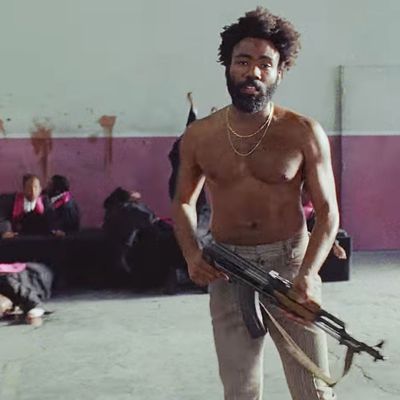
Until last Saturday night, the last we had heard out of Childish Gambino was another man’s funk. For all its considerable energy and for all of the critical acclaim it received, the artist’s previous release, “Awaken, My Love! was a throwback album content to bask in the auras of George Clinton’s Parliament Funkadelic instead of blazing an aesthetic trail of its own. The album’s performance reinforced the existing view of Donald Glover as a talent whose prodigious nature precluded any kind of fixed commitment. When you can do anything well, why do anything for long?
The charm of such an approach — an endless series of apprenticeships, no mastery in sight — was evident. Following Glover’s career, you were always on your toes: anything could come next. This sense of anticipation would only grow once Glover began his work on Atlanta. As a showrunner, writer, and actor, he promoted a worldview where unpredictability took precedence over perfection. Atlanta is odd, encrypted; its flashes of genius gain in frequency but never gather themselves into a pattern. It was a huge and ongoing leap forward for Glover’s art, and as the new video for Childish Gambino’s “This Is America” shows, its shock of its impact has jarred his music out of competent, complacent imitation. As its title suggests, “This Is America” inhabits the present. The spirit of placid revival had vanished along with Obama’s departure from office.
There had been, to be sure, an alternative vision embodied in the word “America,” one that placed an emphasis on ideals like universal liberty and equality of justice under the law, but this lofty mirage had never managed to elude the matter of its implication in the violence of American racism. Created by guns, overflowing with guns, America had always been a sort of rhetorical weapon, its greatness a cudgel applied to recalcitrant people of color at home or abroad. What the Trump campaign and election signaled was an abolition of all alternative Americas, the permanent reduction of the nation to a weapon directed at people whose skin is not pale.
It’s tempting to read the “This Is America” video, directed by a Japanese-American director (Hiro Murai, who also directs Atlanta) and pouring over with black people and black voices, simply as an attempt to restate an alternative, but such a reading would make light of the dilemmas Murai and Glover have carefully inscribed into their vision. Jubilant black culture abounds not only in resistance to the lethal violence directed at its makers, but also in complicity with it: when Glover stages the murder of a black guitarist and a black church choir, it’s not a white policeman pulling the trigger, but Glover himself, and after each killing he resumes his dancing with the same livewire energy and his rapping with the same assured flow, as if nothing had happened. If black culture affirms itself, accurately, as a testament to its makers’ capacity for grace, invention, and vigor in the face of an inhuman social reality, Glover’s own affirmation contains a shadowy admission that such makers cultivate their own agony in the act of representation.
Much as Atlanta exists in the lacuna between Atlanta and Atlanta, “This Is America” draws life from the unsolvable tension within a society whose bloody business is transmuted into cultural potency at relentless speed. The similarity is no accident, either: just as its abrupt shifts in tempo and Murai’s direction cements the video’s link with Glover’s show, the influence of Atlanta, and the Southern rap of which it serves as capital, pervade “This Is America” like a fine mist. Ad-libs are chipped in by the likes of Young Thug, Slim Jxmmi, Blocboy JB, 21 Savage, and Quavo; Thug performs an outro; Blocboy’s dance is replicated in the video.
But it’s the prosody and content of Glover’s lyrics that display the influence most deeply: with its cash-grabbing, fashion-mongering, gun-waving, drug-slinging rhetoric delivered in a clipped triplet flow, the song is a trap number in all but name. The incongruousness of Glover, raised middle-class and a NYU graduate, bragging about his Mexican drug supplier and threatening to have you gunned down, is intentional: it’s a tribute to the cultural dominance of trap music and a reflection on the ludicrous social logic that made the environment from which trap emerges, the logic where money makes the man, and every black man is a criminal. Donald Glover doesn’t trap, but he’s trapped; he runs his own television show, and is always on the run. Only one country could be this bizarre, and no matter what he does, he can only point in its direction.




